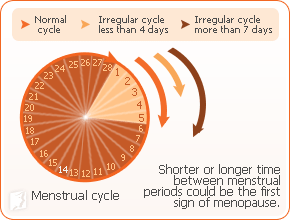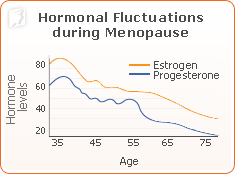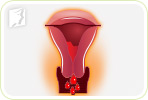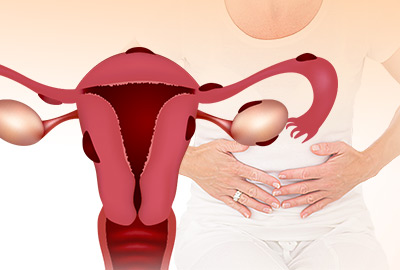Most women are likely to have some form of menstrual irregularities at some point during their lives. This may occasionally disrupt a woman's daily routine, and it can change when and how often a woman becomes fertile, which can be frustrating if she and a partner are trying to conceive.
Fertility and the Menstrual Cycle Explained

Each woman has a different menstruation pattern, and most likely no woman is completely “regular” throughout her life. The average length of a menstrual cycle is between 21 and 35 days.
A woman's period may become more irregular once she begins perimenopause. It's also possible that she may skip a period or two in a row or experience spotting before or after her cycle. A woman's period during perimenopause is often heavier and longer than the ones she has previously experienced. A woman has experienced menopause when she has not had a period for a year. Irregular periods can mean that an egg is not being regularly released each month, which can lead to a problem with fertility if a woman is trying to conceive.
Labeling Irregular Periods
Types of irregular periods that affect the frequency of menstruation include:
- Polymenorrhea. This refers to frequent periods, with intervals of 21 days or less.
- Oligomenorrhea. This is infrequent menstrual cycles or short periods. Frequency exceeds 35 days in between cycles, with less than three days of bleeding.
- Amenorrhea. This is the absence of periods for more than 60 days in reproductive age.
- Hypomenorrhea. This is characterized by a decrease in the flow or the duration of menstruation.
- Menorrhagia. This is an abnormally heavy and prolonged menstrual period. It may be associated with abnormally painful periods.
- Dysmenorrhea. This refers to menstruation that is accompanied by either sharp, intermittent pain or aching pain in the pelvis or lower abdomen.
The Causes of Infertility and Irregular Menstrual Cycles
There are many different causes of infertility, and men can also have fertility problems, so if you are trying to conceive and have questions or think you may have fertility problems, it is important to consult a doctor.

Fertility problems can be caused by ovulation disorders. This includes polycystic ovary syndrome, hypothalamic dysfunction, premature ovarian insufficiency, or too much prolactin in the body.
Healthy fallopian tubes are also necessary for conception. Fallopian tubes can be damaged from pelvic inflammatory disease, previous surgeries that may have impacted the fallopian tubes, and pelvic tuberculosis.
Problems with the cervix and uterus can also cause fertility problems. Polyps and benign tumors, uterine abnormalities, a narrow cervix, or the mucus present in the cervix being too thick for sperm to pass through can all make it difficult to conceive.
A condition called endometriosis, in which the lining of the uterus spreads to other parts of the reproductive system, can cause infertility problems, along with scarring.
Having an irregular menstrual cycle may also make it harder to conceive because it is difficult to identify the days in which ovulation occurs. Click on the following link to learn more about the treatments for irregular menstrual cycles.
Sources
- Hutchinson, Susan M.D. "The Stages of a Woman's Life: Menstruation, Pregnancy, Nursing, Perimenopause, Menopause". November 2007.
- Love, Susan M.D. Menopause and Hormone Book. New York: Three Rivers Press, 2003.
- BMJ Group. "Menopause: What is it?" Patient Leaflet. 2007



